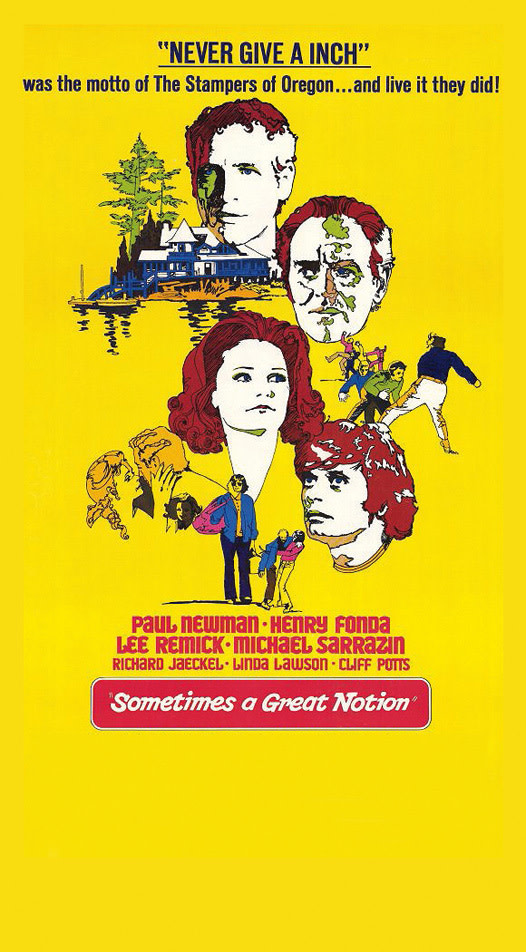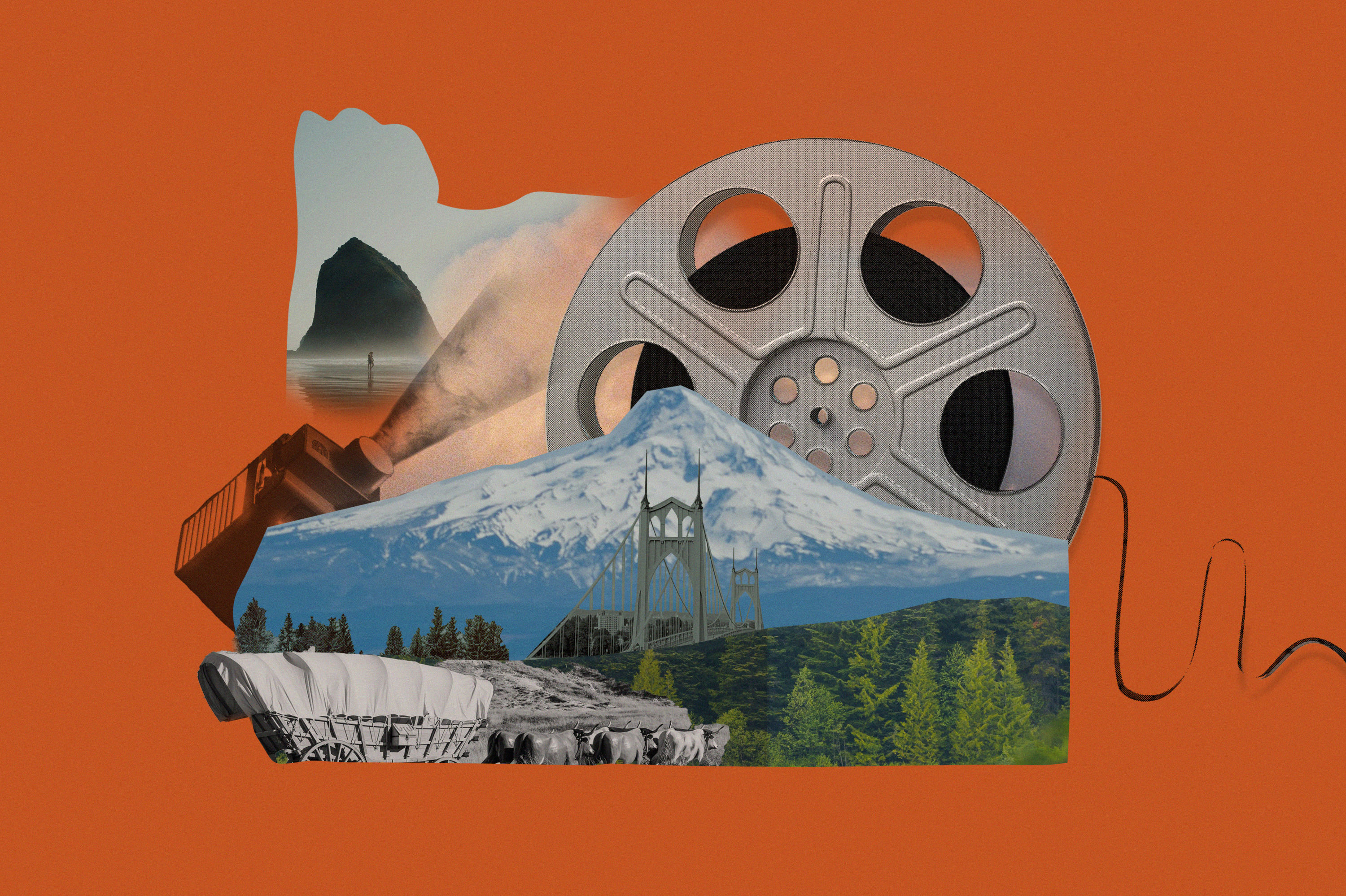Spirit of ’70
FORTY YEARS AGO this month, the City of Roses was all blooms and thorns. Citizens crowded downtown to demonstrate against the US Army’s plan to store nerve gas in Eastern Oregon. Riot police assaulted Portland State students protesting the war in Vietnam, sending dozens to the hospital. But soon Oregonians would be aflutter over Paul Newman’s June arrival in Newport to star in a movie adaptation of Ken Kesey’s classic Sometimes a Great Notion. Legendary architect Lawrence Halprin’s bold new fountain plaza in downtown Portland would be hailed as “one of the most important public spaces since the Renaissance.” Weeks later, Governor Tom McCall held the country’s first government-sponsored rock festival, Vortex I.
The summer of 1970 was the crescendo to a year of upheaval, elation, and foresight that ultimately would give birth to a new Portland, one with a pedestrian-friendly, park-rich central city, a beloved pro basketball team, and a reputation for always going its own way.
But to set the scene, let’s beam back to December 31, 1969. Downtown Portland is, according to the New York Times, “a scattered bomb-site of parking lots.” One local police sergeant quipped, “So many prostitutes worked the corner of Third and Salmon, they had to stay in step to keep from walking on each others’ heels.” Portland’s political power has become so calcified that city commissioners begin leaving office feet-first—dead.
And then …
{page break}
January
Portland Plants a Flag
In an auspicious beginning to a year of change, the City Council adopts an official city flag for Portland. Created by artist and teacher Douglas Lynch (and redrawn by him in 2002), the banner, which portrays two blue rivers converging in a field of green possibilities, still flies over City Hall.
Talking Trash
After years of spending millions of dollars to combat litter, Oregonians have had enough. Legislators vote to form the nonprofit group Stop Oregon Litter and Vandalism (SOLV), initially funding it with a tax on the can and bottling industries. Today, SOLV leads environmental projects in 250 communities, ranging from highway and beach cleanups to removal of invasive species.
Keep Hope … on Life Support
Reflecting Oregon’s perennial tardiness on race relations, Governor Tom McCall denies three Albina ministers’ request to declare Dr. Martin Luther King Jr.’s birthday a statewide holiday. Local black leaders call for a complete boycott of Portland Public Schools and hold a rally in North Portland.
Dam Environmentalists
Oregon Senator Bob Packwood joins with a fellow Republican to sponsor the Hells Canyon–Snake River Bill, which will add 395,000 acres in Idaho and Oregon to the federal wilderness reserve and forever ban the building of dams on the Snake and Salmon rivers.
Making a Living Room
Citing downtown’s increasing congestion and pollution, the Portland City Planning Commission unanimously denies the Meier & Frank Co department store a permit to build an 8- to 10-story parking garage next door. The retailer argues that an 800-car facility plopped in front of Pioneer Courthouse is crucial to its survival and accuses the commission of “discrimination.” But the vote clears the stage for the creation of Pioneer Courthouse Square 14 years later.
{page break}
March
Beyond the Beach Bill
Governor Tom McCall halts all construction projects potentially damaging to the Oregon Coast’s natural environment. “We can no longer go pell-mell into development efforts without regard to the harm we do,” he announces. His order kills the highway commission’s plans for a devastating new path for US 101 and further burnishes the governor’s environmental legacy, which began three years earlier when he led the passage of Oregon’s Beach Bill, forever guaranteeing public access to the state’s entire coastline.
Death of a Commissioner
City Commissioner Stanley Earl keels over of a heart attack. With Commissioner Bill Bowes having died four months earlier, and Commissioner Buck Grayson planning to retire, the Portland City Council is ripe for a transformation in the November election.
April

A poster for Sometimes a Great Notion.
Touching a Nerve
Mirroring the country’s growing frustration with the ongoing war in Vietnam and its growing worries about pollution, 2,000 citizens march downtown to condemn the Army’s plans to store 13,000 tons of nerve and mustard gas in Hermiston. Five weeks of public outrage reach a crescendo in a dramatic “die-in” in front of the Oregonian’s headquarters.
For the Love of Gaia
A Wisconsin senator may have dreamt it up, but it’s Oregonians who celebrate the first Earth Day with a vengeance as students across the city engage in weeklong programs to clean up our corner of Mother Earth, even going so far as to scrub Teddy’s Rough Rider statue in the Park Blocks with soap and water. Governor McCall uses the day to rally opposition against the Army’s nerve-gas storage. “If we are to succeed in saving our planet, the battle will be won or lost at the local level,” he says in an Earth Day speech. Putting a new spin on Cold War rhetoric, he adds, “Oregon is the key state in the domino structure of North America. If we fail, pollution marches on.” After five weeks of protest and a state lawsuit, the Army relents and McCall wins a major battle against the Nixon administration.
Studying the Other History
Amid racial tensions and nationwide unrest over school integration, Portland State University rolls out its Black Studies program “to develop a better understanding of, and rapport with, blacks.” Administrators encourage whites to enroll in the program.
{page break}
May
Playing Fare
TriMet cuts bus fare by 10 cents—from 35 cents to 25 cents—for adults over 65. An overnight success, the program becomes TriMet’s first step toward instituting “Fareless Square,” a free transit zone in downtown, five years later.
The Clash
Angered by the Ohio National Guard’s killing of four student protesters at Kent State University, Portland State students barricade the South Park Blocks and stage a massive weeklong antiwar demonstration. City Commissioner Frank Ivancie sends in a 125-man tactical police squad that storms a first aid tent and sends 28 students to the hospital. As one student recalls, “I looked up in time to see a cop come right down on me with a club, with a big grin on his face.” Mayor Terry Schrunk regrets the violence but remains firm: “I hoped it would never come to this.”
People Speak, Leaders Listen
A day after the clash on the South Park Blocks, a crowd of more than 4,000 marches on City Hall, led not by a long-haired radical, but by civic leader Gertrude Glutsch Jensen. They demand to see Mayor Schrunk. He declines. But 2,800 miles away in Washington, DC, Oregon Republican Senator Mark Hatfield hears the roar and adds to it by sending out 35,000 letters (under his free mailing privilege) signed by him and four other senators calling for a Senate amendment to cut off all funding for the war.
June
Sometimes a Great Story
As both producer and actor (and later director), Paul Newman arrives in Newport to begin shooting a film based on Ken Kesey’s landmark novel Sometimes a Great Notion. The tale, about a family of Oregon loggers trying to cope with changing times, echoes the fractious era it’s being filmed in. As the story’s patriarch, Henry Stamper (played by Henry Fonda), puts it, “Never give an inch.”
“The People’s Park”
Despite the recent violence at Portland State, the Portland Development Commission moves ahead with the dedication of a new plaza, the Auditorium Forecourt Fountain (today known as Keller Fountain). As civic pooh-bahs give speeches and stern police stare down long-haired youths, Lawrence Halprin, the plaza’s architect, grabs the microphone. “These straight people somehow understand what cities can be all about,” he says, acknowledging the pooh-bahs but playing to the kids. “So as you play in this garden, please try to remember we’re all in this together.” Moments later, the kids—and Halprin—douse themselves in the fountain’s 13,000-gallon-per-minute gush, ushering in a new era of civility and a new generation’s civic involvement. New York Times architecture critic Ada Louise Huxtable calls the fountain “the greatest civic space since the Renaissance.”
{page break}
July
The Lion Kings
On the night of July 4, a drunken teenager climbs into the lion’s pen at the Oregon Zoo and is killed by the animals. Two nights later, one of the boy’s friends returns with a rifle and fatally wounds the two lions, Caesar and Sis. The senseless act outrages Portlanders, and the zoo is instantly awash in donations to replace the two beloved animals. Attendance also surges, shooting up by 80,000 from the previous year and helping to renew the zoo’s lease on Portlanders’ hearts.
At the Water’s Edge
City planners unveil a “spectacular and far-reaching” plan to replace the four-lane Harbor Drive on Portland’s downtown waterfront with a public-use “land bank.” Lack of money—and a reluctance to displace the 30,000 cars that travel the road daily—delays the vision until May 1974, when the fantasy is realized as Governor Tom McCall Waterfront Park.
Bridgetown’s New High Bar
The first steel girders are placed on the Fremont Bridge. Over the next three years, the iconic tied-arch span—at 1,255 feet, the longest bridge in Oregon and the second longest in the world—rises across the Willamette to connect I-405 to I-5 and complete New York consultant Robert Moses’s bold freeway plan for downtown.
Reaching for the Sky
Georgia-Pacific dedicates its new international headquarters (now the Standard Insurance Center) and, at 367 feet, Portland’s tallest skyscraper to date. That record soon succumbs to the 546-foot-tall First National Center (now the Wells Fargo Center), already under construction. The city will approve three more high-rises this year.
August
A Matter of Choice
Abortion became legal in 1969, and the number of abortions skyrockets in the first half of 1970, totaling about 2,940 since January (about every 1 in 5 pregnancies). Although 44 hospitals in Oregon perform the procedure, battle lines are drawn, and conservative doctors are outraged.
Spin City
An emergent bicycling lobby suffers an early defeat when the Oregon State Highway Division removes the sidewalk on the Willamette River Bridge near Wilsonville. “It is too bad that when many civilized countries are building
bike and pedestrian pathways, we continue
to destroy ours,” one cyclist laments.
Fighting with Fire
A Molotov cocktail flies through the door of the Selective Service office in Northeast Portland, destroying $1,600 worth of files and equipment. This is the third firebomb attack on the building since January. Two Portland members of the anti-conscription White Panther Party are eventually charged for the attack.
A Plan for a New Portland
Planner Richard Ivey begins rallying businessmen and city officials behind a major downtown renewal effort. By November, the city’s Citizen Advisory Committee begins shaping Portland’s most celebrated (and implemented) blueprint—the 1972 Downtown Plan—laying the groundwork for the shop-lined, park-dotted, pedestrian-friendly downtown we know today.
{page break}
August/September
Into the Vortex
Fearing a clash between radical anti-war groups and the national convention of the American Legion in Portland, Governor Tom McCall takes the political risk of his life by sponsoring a decoy: Vortex I, the country’s first state-sponsored rock festival. Just weeks before the vote in McCall’s close reelection battle, six days of music, drugs, and nudity ensue at McIver State Park in Estacada. Both the festival and the legionnaires’ fête (complete with a surprise visit from Vice President Spiro Agnew) go off without a hitch.
The Bus Project
After vicious battles with local businesses over tax increases, the fledgling Tri-County Metropolitan Transportation District (TriMet) takes over the suburban Blue Bus Lines, adding 75 new vehicles and marking the beginning of a centralized regional mass-transit system in Portland.
October
Hoop Dreams
In the Trail Blazers’ first home game of their first season in the NBA, less than 3,000 fans watch the team soundly defeat the Cleveland Cavaliers (another expansion team) 120–98 at the 10-year-old Memorial Coliseum.
November
Triumphant Tom
McCall wins a second term as governor, trouncing his Republican opponent, Robert W. Straub, with 57 percent of the vote. Though McCall concedes that he was “caught in the terrible riptide of taxpayer discontent,” his resounding win vindicates his efforts on behalf of peace and the environment—and his gamble on Vortex I.
A Rising Star
Thirty-year-old lawyer Neil E. Goldschmidt is elected to Portland City Council, launching one of Oregon’s most storied political careers and Portland’s most profound period of change. In two years, he will become mayor and—with the 1972 Downtown Plan as his map—lead a revolution in city planning, reviving the central city and the innermost neighborhoods and trading the proposed Mt Hood Freeway for Portland’s first light-rail line, the East Side MAX. But his first goal: increasing citizen involvement.
Cracking the Liberty Bell
As the city prepares to celebrate Thanksgiving, 1970 offers a final growl of anger when a bomb explodes underneath the City Hall portico, destroying the city’s replica of the Liberty Bell. The blast upends Mayor Schrunk’s desk on the second floor and causes $170,000 in damage. No one claims responsibility, and no arrests are made.
{page break}
December
Movie Madness
M.A.S.H., Catch-22, Patton, Guess Who’s Coming to Dinner, Easy Rider, 2001: A Space Odyssey, and Woodstock light up Portland’s silver screens.
Party Favors
With 11 incumbent Republican governors kicked out of office in the November election, Vice President Spiro Agnew arrives at an annual GOP governors’ conference in Sun Valley, Idaho, to rally the party faithful. Behind closed doors, he tells the guvs to “chew your opponent’s nuts out before he chews out yours.” Publicly, he coaches them merely to “attack.” Having won his office despite the odds, an empowered Governor McCall makes national headlines observing the “unbelievable, incredible misunderstanding of the mood of America in that rotten, bigoted little speech.” Confronted by Agnew about the quote, McCall replies, “I don’t think I said ‘little.’”
PDX Goes Jumbo
United Airlines lands a 747 to train ground crews. Although regular jumbo jet service is still years away, the flying behemoth’s arrival gives a PR push to the airport’s massive expansion plans—which include a 10,000-foot runway extension—in a bid to become a truly international hub.
Mirages on the Horizon
The federal Department of Transportation unveils a prototype linear induction passenger train that could travel at speeds of 250 miles per hour on conventional tracks retrofitted with a magnetic rail. Researchers in New York predict that a hybrid gas/electric car will be in full production by 1975.
Our Winter Dreams
Tom McCall publishes an open letter wishing his fellow Oregonians a Merry Christmas and a Happy New Year. Anticipating the communal spirit that will come to define Portland, the governor closes, “If we are men of goodwill and compassion, no barrier can keep us from joining to build the kingdom that haunts our winter dreams.”





